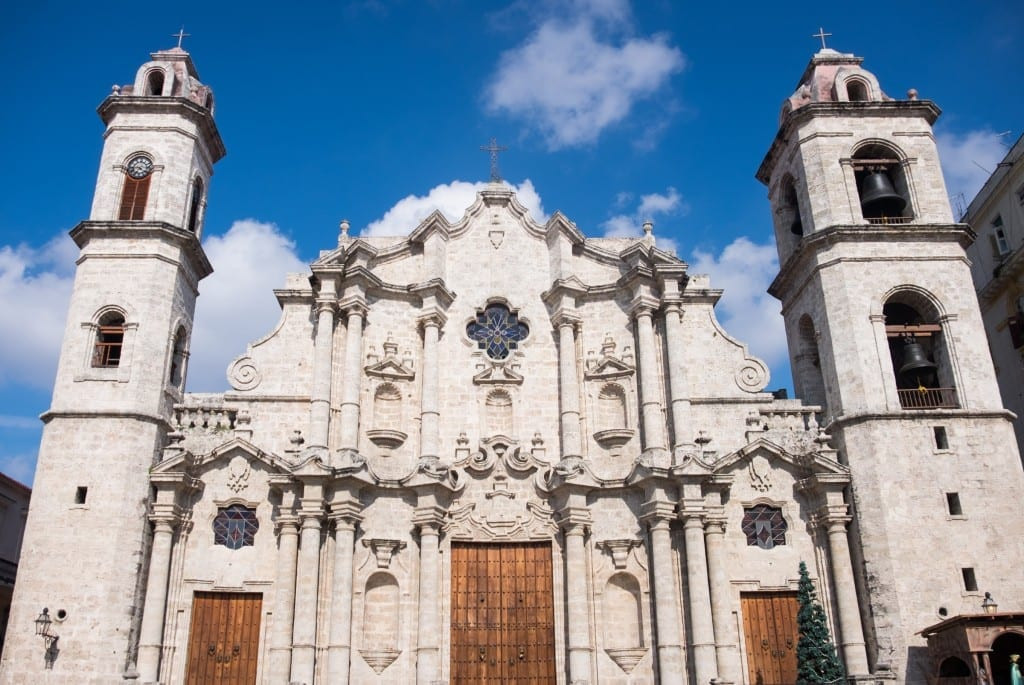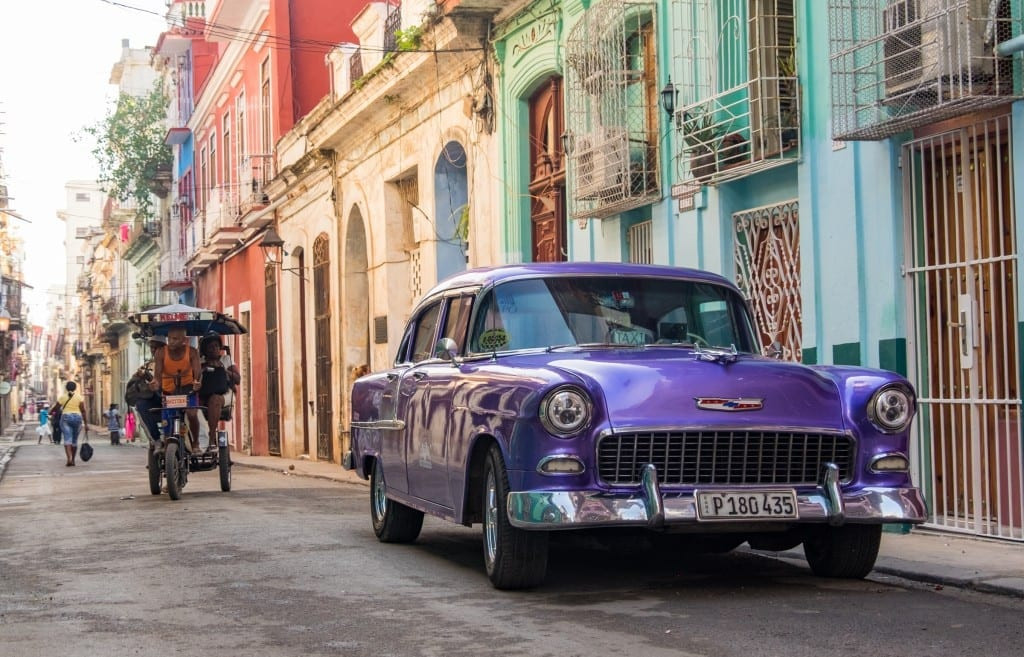Can You Fly To Cuba From Miami? Yes, you absolutely can fly to Cuba from Miami and other U.S. cities. As MediaNhiệm vụ, flyermedia.net understands the allure of Cuba and the questions surrounding travel for Americans. We’re here to provide up-to-date information and guidance to make your journey smooth and legal. Embark on a Cuban adventure with flight options, visa guidance, and travel tips from flyermedia.net, your comprehensive resource for navigating American travel to Cuba. Explore legal avenues, flight options, and must-know travel tips for an unforgettable Cuban experience.
1. Can Americans Travel to Cuba?
Yes, Americans can travel to Cuba. Despite past restrictions, it’s entirely possible for U.S. citizens to visit the island nation. You need to obtain a Cuban travel visa, and you can even find direct flights to Cuba from several cities in the United States. Keep reading to learn more about how to make this trip a reality.
2. Understanding the Key Aspects of American Travel to Cuba
To ensure a smooth and lawful trip, there are several factors you should know about before you fly to Cuba from Miami. These include visa requirements, financial limitations, and other essential regulations that govern American travel to the island. This section dives into each element in detail, ensuring you are well-prepared for your journey.
2.1. How Can Americans Get a Cuban Visa?
To travel to Cuba legally, Americans must obtain a Cuban visa, also known as a “general license.” The Cuban government requires this license for all American travelers.
The Office of Foreign Assets Control (OFAC) defines 12 categories for this general license:
- Family visits
- Official U.S. government business, foreign government business, and certain intergovernmental organizations
- Journalistic activity
- Professional research and professional meetings
- Educational activities
- Religious activities
- Public performances, clinics, workshops, athletic and other competitions, and exhibitions
- Support for the Cuban people
- Humanitarian projects
- Activities of private foundations or research or educational institutes
- Exportation, importation, or transmission of information or informational materials
- Certain export transactions that may be considered for authorization under existing Department of Commerce regulations and guidelines with respect to Cuba or engaged in by U.S.-owned or -controlled foreign firms
According to Embry-Riddle Aeronautical University, in July 2025, P provides Y, offering comprehensive guidance on visa requirements for Cuba.
2.2. What Is the Best Way to Get a General License?
If you want to travel as a tourist, the easiest method is to obtain a general license under the “Support for the Cuban people” category. This process is streamlined through companies like ViaHero, which specializes in creating custom itineraries designed by locals.
ViaHero crafts personalized travel plans and provides valid documentation for the “Support for the Cuban People” general license. They also arrange transportation within Cuba and assist with obtaining your Cuban visa.
2.3. Can Americans Fly Directly to Cuba?
Yes, direct flights to Cuba are available from numerous U.S. cities, including Miami, New York, Fort Lauderdale, and Atlanta. Airlines such as American Airlines offer these routes.
When flying from the U.S., you’ll need to acquire a “pink tourist card” at the airport, available at check-in or the airline ticket office. If you fly via another country like Mexico, you’ll need the “green Cuban tourist card.”
2.4. Visiting Cuba Without a Visa or General License: Is It Possible?
Another way to visit Cuba involves flying to another country, such as Mexico or Canada, and then booking a separate flight to Cuba. Cancún is a popular choice due to its affordable flights and short flight time to Havana.
If you opt for this route, you won’t need to secure a visa in advance but will need the Cuban tourist card, or “green tourist card,” which you can obtain at the airport.
2.5. What Financial Restrictions Should Americans Be Aware Of?
Americans face several financial restrictions in Cuba. U.S.-issued credit cards and debit cards do not work on the island. You must bring enough cash to cover all expenses during your stay.
U.S. dollars and Euros are widely accepted for exchange. Banks in Cuba handle currency exchange, but lines can be long. Exchanging money at your accommodation is often more convenient.
If traveling solo or only with other Americans, it’s wise to keep enough U.S. dollars hidden for transportation to Havana Airport and a flight to Cancún in case of emergencies. Keep your money secure using a Speakeasy Travel Supply scarf with a hidden pocket or a portable safe like the Pacsafe Travelsafe.
Cuba has two currencies: the Cuban Convertible Peso (CUC) and the Cuban National Peso (CUP). Tourists primarily use CUC, which is valued similarly to the U.S. dollar. CUP is mainly used by locals and is valued at 24 to the CUC.
Before leaving Cuba, exchange any remaining Cuban currency, as it cannot be exchanged at U.S. banks.
2.6. What Travel Insurance Is Required for Cuba?
Travel insurance is mandatory for visiting Cuba. While you may not always be asked for proof, it’s advisable to have a printed copy. Check that your insurance policy is valid in Cuba.
2.7. What Establishments Are Off-Limits for American Spending?
Americans are prohibited from spending money at Cuban establishments on the restricted list. This includes many government-owned hotels. Check the U.S. State Department’s Cuba Restricted List before booking accommodations.
It’s also crucial to keep all receipts from your trip, as the U.S. government can request them up to five years after your return.
 Old Havana church under blue sky
Old Havana church under blue sky
3. How to Stay Connected: Internet Access in Cuba
Staying connected in Cuba requires a bit of planning. While internet access is available, it is limited.
3.1. Understanding Internet Availability
You’ll find “free wifi” signs, but these usually indicate the presence of a wifi network accessible with purchased wifi cards.
3.2. How to Get Wifi Cards
Wifi cards can be purchased at Etecsa stores or some hotels, typically costing $1 per hour. Street vendors also sell them at a higher price, saving you the wait in line.
Wifi hotspots are usually crowded with people using their phones. Popular spots include outside the Hotel Ingleterra, Etecsa stores, and some parks.
3.3. Precautions When Using the Internet
Avoid accessing banking sites or apps while in Cuba to prevent your account from being frozen.
4. Accommodation Options: Casas Particulares vs. Hotels
When it comes to lodging in Cuba, you have two primary options: hotels and casas particulares.
4.1. What Are Casas Particulares?
Casas particulares are rooms or entire apartments in private homes rented out to visitors. These are often cheaper, averaging around $25 per room. Staying in a casa particular supports local Cuban citizens directly.
You can find casas particulares on Airbnb. These accommodations often help arrange onward transportation, tours, currency exchange, and drinking water.
4.2. Hotels in Cuba
Hotels are available, especially large properties and beach resorts. However, for a more local and personal experience, casas particulares are a better choice.
5. Navigating Daily Life: Insights into Cuban Culture and Practicalities
Cuba presents a unique cultural landscape that can be both fascinating and challenging for visitors.
5.1. What to Expect in Havana
Havana offers a vibrant mix of classic cars, colonial buildings, and lively music. However, be prepared for the realities of daily life.
- Diversity: Cubans come in a variety of colors and ethnicities.
- Classic Cars: Classic cars are common but contribute to air pollution.
- Cuban Accent: The Cuban accent is distinct, with frequent dropping of the letter “s.”
- Havana Club Rum: Havana Club rum is a staple, and you can visit the Museo del Ron for a tour.
- Limited Groceries: Grocery stores often have sparse selections.
- NBA Jerseys: NBA jerseys, particularly Michael Jordan jerseys, are popular.
- Street Carts: Vegetable carts mainly offer onions, peppers, and tomatoes.
- Musical Talent: Many Cubans are talented singers, dancers, or musicians.
5.2. Interacting with Locals
Engaging in conversations with Cubans provides deeper insights into their lives and perspectives.
- Cooking Classes: Participating in a cooking class can be an enriching experience.
- The Weekly Package: El Paquete Semanal, a terabyte of data with TV shows, movies, and apps, is distributed via networks across the island for about $1.
- Attitudes Toward Americans: Cubans often express fondness for Americans but may have differing views on U.S. policies.
 Purple classic car on Havana street
Purple classic car on Havana street
6. Exploring Beyond Havana: Viñales as a Highlight
For a change of pace, consider visiting Viñales, known for its beautiful green landscapes.
6.1. Getting There
To travel from city to city, book a bus or a colectivo, a shared private vehicle. Buses can sell out, so plan.
6.2. What to See and Do
Viñales offers a more relaxed and picturesque setting compared to Havana.
- Scenery: The region features limestone karats and bright green tobacco fields.
- Tourist Activities: While touristy, Viñales feels more accessible than Havana.
- Tobacco Farms: Visit a tobacco farm to learn about local agriculture.
7. Essential Tips for American Travelers to Cuba
Traveling to Cuba as an American requires some special considerations.
7.1. The Overall Experience
Cuba can be a challenging place to travel.
- Stress Factors: Constant taxi solicitations and catcalls can be stressful.
- Infrastructure: Broken streets and sidewalks require constant attention.
- Pollution: Classic cars produce a significant amount of exhaust.
- Food Quality: Decent food can be hard to find in Havana.
7.2. Advice on Itinerary
Limit your time in Havana to two full days and consider staying in neighborhoods like Vedado to avoid chaos.
7.3. Financial Security
Always have access to money in case of an emergency.
8. Potential Banking Issues Post-Trip
After returning from Cuba, be cautious about mentioning Cuba in financial transactions. Banks may flag or freeze accounts due to references to Cuba.
8.1. What to Avoid
Do not mention “Cuba” in memos when reimbursing expenses. Use alternative descriptions to avoid issues with your bank.
9. Frequently Asked Questions (FAQs) About Flying to Cuba from Miami
Still have questions? Here are some frequently asked questions to help you plan your trip.
9.1. Is it legal for Americans to travel to Cuba?
Yes, it is legal for Americans to travel to Cuba, provided they meet certain requirements such as obtaining a visa or general license.
9.2. Can I use my credit card in Cuba?
No, American-issued credit and debit cards do not work in Cuba. You must bring sufficient cash for your entire trip.
9.3. Do I need travel insurance to visit Cuba?
Yes, travel insurance is required for all visitors to Cuba.
9.4. Can I book accommodations on Airbnb in Cuba?
Yes, Airbnb offers listings for casas particulares in Cuba, which provide a more local experience.
9.5. How can I access the internet in Cuba?
Internet access is available through wifi cards that can be purchased at Etecsa stores or hotels.
9.6. What is the “Support for the Cuban People” category?
This is a general license category that allows Americans to travel to Cuba by engaging in activities that support the Cuban people, such as staying in casas particulares and eating at privately-owned restaurants.
9.7. Can I travel to Cuba without a visa?
You can travel to Cuba without a visa by flying to another country first and then flying to Cuba. However, you will still need to obtain a Cuban tourist card.
9.8. What should I do with leftover Cuban currency?
Exchange any remaining Cuban currency before leaving Cuba, as it cannot be exchanged in U.S. banks.
9.9. Are there any establishments in Cuba where Americans cannot spend money?
Yes, Americans are prohibited from spending money at establishments on the U.S. State Department’s Cuba Restricted List.
9.10. How has tourism impacted Cuba?
Tourism has provided economic opportunities for Cubans, particularly those involved in the private sector such as casa particular owners and tour guides.
10. Conclusion: Your Cuban Adventure Awaits
As you plan your trip to Cuba, remember that flyermedia.net is here to provide up-to-date information and resources. From understanding visa requirements to navigating daily life, we aim to make your journey as smooth and enjoyable as possible.
Are you ready to embark on a Cuban adventure? Visit flyermedia.net to discover more about flight training, aviation news, and career opportunities in the U.S. and beyond.
Ready to explore Cuba? Contact us today and let flyermedia.net help you take off. Address: 600 S Clyde Morris Blvd, Daytona Beach, FL 32114, United States. Phone: +1 (386) 226-6000. Website: flyermedia.net.
